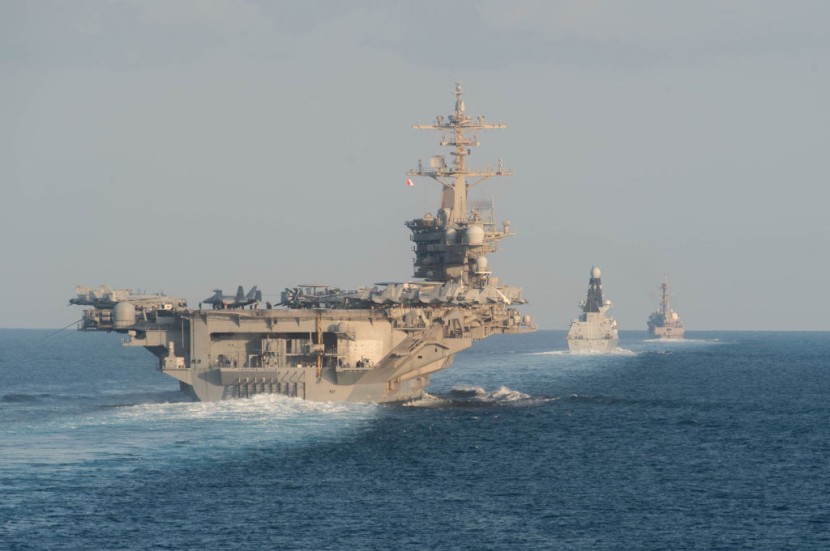
The US military is considering placing armed personnel on commercial ships traveling through the Strait of Hormuz in an unprecedented move to prevent Iran from detaining and harassing civilian vessels.
During the "Tanker War," which culminated in a 1988 naval confrontation between the US Navy and Iran that was the Navy's largest since World War II, the United States took no action.
US Could Offer Troops to Commercial Ships in Strait of Hormuz
While officials provided few details of the plan, thousands of Marines and sailors are en route to the Persian Gulf aboard the amphibious assault ship USS Bataan and the landing ship USS Carter Hall.
Per Politico, these Marines and sailors could serve as the backbone of any armed security mission in the strait, through which 20% of the world's crude oil passes. The Iranian delegation to the United Nations did not respond promptly to a request for comment on the US proposal.
Four US officials discussed the proposal on the condition of anonymity and acknowledged its broad outlines. The officials emphasized that no definitive decision had been made and that discussions continue between US military officials and the region's Arab Gulf allies.
According to the officials, the Marines and Navy sailors will only provide security at the behest of the ships engaged. The Bataan and Carter Hall departed Norfolk, Virginia, on July 10 for a mission characterized by the Pentagon as a "response to recent Iranian attempts to imperil the free passage of commerce in the Strait of Hormuz and its surrounding waters."
The Bataan entered the Mediterranean Sea last week after passing through the Strait of Gibraltar en route to the Middle East. The United States has already dispatched A-10 Thunderbolt II warplanes, F-16 and F-35 fighters, and the destroyer USS Thomas Hudner to the region in response to Iran's maritime activities.
According to the Washington Post, the effort has not yet received a final sanction, but it has the support of senior Biden administration officials and could begin as early as this month, according to a government official who requested anonymity to discuss sensitive military planning.
Marines from Camp Lejeune, North Carolina, have been flown to Bahrain and trained there; additional personnel will appear aboard American warships shortly. US Navy officials claim they prevented Iran from seizing oil transports.
Oil Tanker Seizures in Strait of Hormuz
John Kirby, a White House spokesman, referred queries to the Defense Department and noted that the Strait of Hormuz, where some of the incidents have occurred, is a "vital waterway."
According to him, Iran has issued threats to shut down this "choke point." The strait connects the Persian Gulf to the Gulf of Oman and the open ocean. Twenty percent or more of the world's crude oil is transported via the strategic waterway.
The initiative is part of a series of aggressive measures pursued by the Biden administration in response to an alleged increase in Iranian attempts to commandeer commercial tanker ships. US and British warships responded to a distress call on June 4 from a merchant vessel traversing the Strait of Hormuz, where three Iranian fast-attack boats were harassing the vessel, according to Navy officials.
In response, the McFaul and the Royal Navy frigate HMS Lancaster launched a helicopter to drive the Iranian ships away. According to the Navy, the Iranian Islamic Revolutionary Guard Corps commandeered the oil tanker Niovi in the Strait of Hormuz in May.
The civilian vessel had left Dubai and was en route to the United Arab Emirates when it was enveloped by twelve fast-attack vessels. In April, Iran seized the oil tanker Advantage Sweet in a similar manner. The United States has dispatched A-10 Thunderbolt II warplanes, F-16 and F-35 fighters, the destroyer USS Thomas Hudner, and other warships to the region in response to Iran's maritime activities.
Iran has taken notice of the deployment, with its top diplomat assuring neighboring nations that the region does not need "foreigners" to provide security. The resumption of hostilities occurs as Iran enriches uranium closer than ever before to weapons-grade levels following the collapse of the 2015 nuclear agreement.
In addition, international investigators believe that Iran has enough enriched uranium to produce "several" nuclear weapons if it chooses to do so. Iran asserts that its nuclear program is for peaceful purposes, and US intelligence agencies conclude that Tehran is not pursuing nuclear weapons.
The United States has also pursued ships believed to be transporting sanctioned Iranian crude, according to AP News. As no company has yet to unload it, a ship transporting allegedly Iranian crude is likely stranded off the coast of Texas due to energy industry concerns about another Iranian seizure.
Related Article : Niger: US Orders Partial Embassy Evacuation After Coup Leaders Refused To Surrender
© 2025 HNGN, All rights reserved. Do not reproduce without permission.








